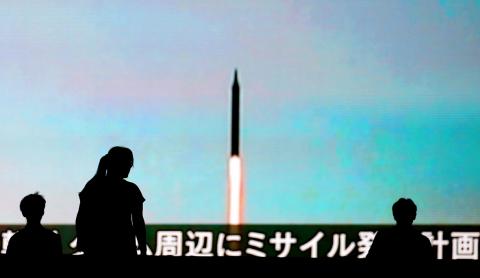North Korea yesterday announced a detailed plan to send a salvo of four missiles over Japan and toward the US territory of Guam, raising the stakes in a stand-off with US President Donald Trump, who it said was “bereft of reason.”
The scheme to target the island, a key US military stronghold, was intended to “signal a crucial warning,” as “only absolute force” would have an effect on the US leader, Pyongyang said.
The declaration came after Trump said that the US’ nuclear arsenal was “far stronger and more powerful than ever before.”

Photo: Reuters
The region was facing “a mini Cuban Missile Crisis,” said John Delury, a professor at Yonsei University in Seoul.
Trump’s remarks were “a load of nonsense,” said General Kim Rak-gyom, the commander of the North’s missile forces, according to Pyongyang’s Korean Central News Agency. “Sound dialogue is not possible with such a guy bereft of reason.”
The military would complete the Guam plan by the middle of this month and submit it to North Korean leader Kim Jong-un for consideration, he said.
The statement said the four missiles would be launched simultaneously and overfly the Japanese prefectures of Shimane, Hiroshima and Kochi.
They would have a flight time of 17 minutes, 45 seconds, travel 3,356.7km and come down 30km to 40km from Guam, it said, which would put the impacts just outside US territorial waters.
Japan, which has in the past warned it would shoot down any missiles that threaten its territory, said that it could “never tolerate” provocations from North Korea.
Japanese Minister of Defense Itsunori Onodera told a Japanese parliamentary session that a missile attack on the US territory would breach the US deterrence against an attack on Japan.
He said that would be a Japanese national emergency, because it would threaten its existence as a nation.
Japan in that case can exercise the right to “collective” self-defense and activate its Aegis missile defense system, he said.

AGING: As of last month, people aged 65 or older accounted for 20.06 percent of the total population and the number of couples who got married fell by 18,685 from 2024 Taiwan has surpassed South Korea as the country least willing to have children, with an annual crude birthrate of 4.62 per 1,000 people, Ministry of the Interior data showed yesterday. The nation was previously ranked the second-lowest country in terms of total fertility rate, or the average number of children a woman has in her lifetime. However, South Korea’s fertility rate began to recover from 2023, with total fertility rate rising from 0.72 and estimated to reach 0.82 to 0.85 by last year, and the crude birthrate projected at 6.7 per 1,000 people. Japan’s crude birthrate was projected to fall below six,

US President Donald Trump in an interview with the New York Times published on Thursday said that “it’s up to” Chinese President Xi Jinping (習近平) what China does on Taiwan, but that he would be “very unhappy” with a change in the “status quo.” “He [Xi] considers it to be a part of China, and that’s up to him what he’s going to be doing, but I’ve expressed to him that I would be very unhappy if he did that, and I don’t think he’ll do that. I hope he doesn’t do that,” Trump said. Trump made the comments in the context

SELF-DEFENSE: Tokyo has accelerated its spending goal and its defense minister said the nation needs to discuss whether it should develop nuclear-powered submarines China is ramping up objections to what it sees as Japan’s desire to acquire nuclear weapons, despite Tokyo’s longstanding renunciation of such arms, deepening another fissure in the two neighbors’ increasingly tense ties. In what appears to be a concerted effort, China’s foreign and defense ministries issued statements on Thursday condemning alleged remilitarism efforts by Tokyo. The remarks came as two of the country’s top think tanks jointly issued a 29-page report framing actions by “right-wing forces” in Japan as posing a “serious threat” to world peace. While that report did not define “right-wing forces,” the Chinese Ministry of Foreign Affairs was

PREPAREDNESS: Given the difficulty of importing ammunition during wartime, the Ministry of National Defense said it would prioritize ‘coproduction’ partnerships A newly formed unit of the Marine Corps tasked with land-based security operations has recently replaced its aging, domestically produced rifles with more advanced, US-made M4A1 rifles, a source said yesterday. The unnamed source familiar with the matter said the First Security Battalion of the Marine Corps’ Air Defense and Base Guard Group has replaced its older T65K2 rifles, which have been in service since the late 1980s, with the newly received M4A1s. The source did not say exactly when the upgrade took place or how many M4A1s were issued to the battalion. The confirmation came after Chinese-language media reported